VUE hello world 程序
<!DOCTYPE html>
<head>
<meta charset="UTF-8">
<meta name="viewport" content="width=device-width, initial-scale=1.0">
<title>hello world</title>
<script src="https://unpkg.com/vue@next"></script>
</head>
<body>
<div id="root"></div>
</body>
<script>
const app = Vue.createApp({ <!-- vue实例 -->
template:`<div>hello world</div>`
})
app.mount("#root") <!-- 注册到 div root -->
</script>
</html>1 插值表达式
在 “{{}}”中可以写入一行表达式,可以直接获取data的数据。
<!DOCTYPE html>
<head>
<meta charset="UTF-8">
<meta name="viewport" content="width=device-width, initial-scale=1.0">
<title>hello world</title>
<script src="https://unpkg.com/vue@next"></script>
</head>
<body>
<div id="root"></div>
</body>
<script>
const app = Vue.createApp({
data(){
return{
message:'hello world'
}
},
template:`<div>{{message}}</div>`
})
app.mount("#root")
</script>
</html>
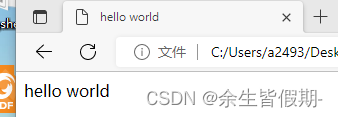
1.2 使用 v-html 进行html元素插值
<script>
const app = Vue.createApp({
data(){
return{
message:'<strong>hello world</strong>'
}
},
template:`<div>{{message}}</div>`
})
app.mount("#root")
</script>如果单纯插值表达式,会将 html 标签原样输出
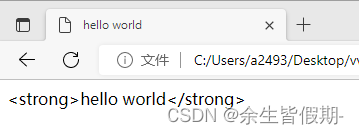
此刻使用 v-html 可以解决这个问题,v-html 指令是设置 innerHTML
<script>
const app = Vue.createApp({
data(){
return{
message:'<strong>hello world</strong>'
}
},
template:`<div v-html="message"></div>`
})
app.mount("#root")
</script>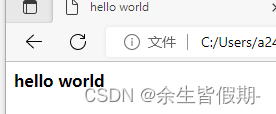
1.3 对 html 元素名字进行插值
使用 [attributeName] 即可插值属性名
<!DOCTYPE html>
<head>
<meta charset="UTF-8">
<meta name="viewport" content="width=device-width, initial-scale=1.0">
<title>hello world</title>
<script src="https://unpkg.com/vue@next"></script>
</head>
<body>
<div id="root"></div>
</body>
<script>
const app = Vue.createApp({
data(){
return{
name:'title',
message:'dell'
}
},
template:`
<div v-bind:[name]="message"></div> <!-- 属性名插值语法 -->
`
})
app.mount("#root")
</script>
</html>
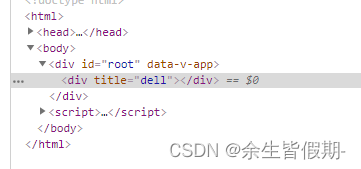
2 数据绑定
Vue中有2种数据绑定的方式:
单向绑定(v-bind):数据只能从data流向页面
双向绑定(v-model):数据不仅能从data流向页面,还可以从页面流向data
备注:
双向绑定一般都应用在表单类元素上(如:<input>、<select>、<textarea>等)
v-model:value 可以简写为 v-model,因为 v-model 默认收集的就是 value 值
<!DOCTYPE html>
<head>
<meta charset="UTF-8">
<meta name="viewport" content="width=device-width, initial-scale=1.0">
<title>hello world</title>
<script src="https://unpkg.com/vue@next"></script>
</head>
<body>
<div id="root"></div>
</body>
<script>
const app = Vue.createApp({
data(){
return{
mes11:"uuu"
}
},
template:`
<input type="text" v-bind:value="mes11"/> <!-- 单项绑定 -->
<input type="text" v-model="mes11"/> <!-- 双向绑定 -->
`
})
app.mount("#root")
</script>
</html>
2.1 checkbox表单的双向绑定
<!DOCTYPE html>
<head>
<meta charset="UTF-8">
<meta name="viewport" content="width=device-width, initial-scale=1.0">
<title>hello world</title>
<script src="https://unpkg.com/vue@next"></script>
</head>
<body>
<div id="root"></div>
</body>
<script>
const app = Vue.createApp({
data:function(){
return({
msg:[]
})
},
template: `
{{msg}}
jack <input type="checkbox" v-model="msg" value="jack" />
dell <input type="checkbox" v-model="msg" value="dell" />
lee <input type="checkbox" v-model="msg" value="lee" />
`
})
app.mount("#root")
</script>
</html>使用数组类型可以获得 checkbox的合集
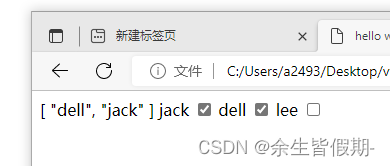
2.2 option表单的双向绑定
<!DOCTYPE html>
<head>
<meta charset="UTF-8">
<meta name="viewport" content="width=device-width, initial-scale=1.0">
<title>hello world</title>
<script src="https://unpkg.com/vue@next"></script>
</head>
<body>
<div id="root"></div>
</body>
<script>
const app = Vue.createApp({
data:function(){
return({
msg:'A'
})
},
template: `
{{msg}}
<select v-model="msg">
<option>A</option>
<option>B</option>
<option>C</option>
</select>
`
})
app.mount("#root")
</script>
</html>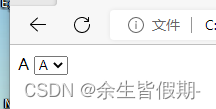
3 计算属性 computed
computed是vue的计算属性,是根据依赖关系进行缓存的计算,只有在它的相关依赖发生改变时才会进行更新。
<!DOCTYPE html>
<head>
<meta charset="UTF-8">
<meta name="viewport" content="width=device-width, initial-scale=1.0">
<title>hello world</title>
<script src="https://unpkg.com/vue@next"></script>
</head>
<body>
<div id="root"></div>
</body>
<script>
const app = Vue.createApp({
data(){
return{
message:"hello world",
count:2,
price:5
}
},
computed:{
total(){
return this.count * this.price
}
},
template:`
<div>{{total}}</div>
`
})
app.mount("#root")
</script>
</html>
结果输出 10
4 侦听器 watch
watch对象中,属性名为侦听的数据名,当数据被修改即可调用这个函数。
computed 和 watch 都能实现的功能建议使用conputed实现,更加简洁而且有缓存。
<!DOCTYPE html>
<head>
<meta charset="UTF-8">
<meta name="viewport" content="width=device-width, initial-scale=1.0">
<title>hello world</title>
<script src="https://unpkg.com/vue@next"></script>
</head>
<body>
<div id="root"></div>
</body>
<script>
const app = Vue.createApp({
data(){
return{
msga:"hello"
}
},
watch:{
msga(){
setTimeout(()=>{
console.log(111)
},1000)
}
},
template:`
<input v-model="msga"/>
`
})
app.mount("#root")
</script>
</html>
5 事件绑定
v-on:click 等价于 @click 点击后触发事件
<!DOCTYPE html>
<head>
<meta charset="UTF-8">
<meta name="viewport" content="width=device-width, initial-scale=1.0">
<title>hello world</title>
<script src="https://unpkg.com/vue@next"></script>
</head>
<body>
<div id="root"></div>
</body>
<script>
const app = Vue.createApp({
data() {
return {
counter: "1"
}
},
methods:{
handleBtnClick:function(event){
console.log(event.target) <!-- target可以获得原生事件 -->
}
},
template: `
<div @click="handleBtnClick">{{counter}}</div>
`
})
app.mount("#root")
</script>
</html>5.1 事件绑定参数
事件绑定可以传递参数,$event 可以传递真实的dom
<!DOCTYPE html>
<head>
<meta charset="UTF-8">
<meta name="viewport" content="width=device-width, initial-scale=1.0">
<title>hello world</title>
<script src="https://unpkg.com/vue@next"></script>
</head>
<body>
<div id="root"></div>
</body>
<script>
const app = Vue.createApp({
data() {
return {
counter: "1"
}
},
methods:{
handleBtnClick:function(num,event){
console.log(event)
}
},
template: `
<div @click="handleBtnClick(2,$event)">{{counter}}</div>
`
})
app.mount("#root")
</script>
</html>5.2 事件绑定修饰符 阻止冒泡
<!DOCTYPE html>
<head>
<meta charset="UTF-8">
<meta name="viewport" content="width=device-width, initial-scale=1.0">
<title>hello world</title>
<script src="https://unpkg.com/vue@next"></script>
</head>
<body>
<div id="root"></div>
</body>
<script>
const app = Vue.createApp({
data() {
return {
counter: "1"
}
},
methods:{
handleDivClick:function(){
console.log('dev')
},
handleBtnClick:function(){
console.log('button')
}
},
template: `
<div @click="handleDivClick">
<button @click="handleBtnClick">button</button>
</div>
`
})
app.mount("#root")
</script>
</html>如果事件嵌套事件,会冒泡触发,内部的实现会触发外部事件。
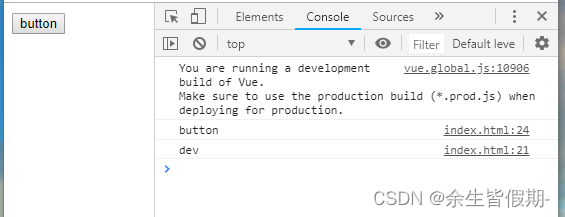
对外层元素使用 .self 即可阻止冒泡
<div @click.self="handleDivClick">
<button @click="handleBtnClick">button</button>
</div>事件修饰符还有 .prevent 阻止默认行为,.capture 捕获模式,.once 只执行一次等...
6 按键修饰符
<!DOCTYPE html>
<head>
<meta charset="UTF-8">
<meta name="viewport" content="width=device-width, initial-scale=1.0">
<title>hello world</title>
<script src="https://unpkg.com/vue@next"></script>
</head>
<body>
<div id="root"></div>
</body>
<script>
const app = Vue.createApp({
methods:{
handleKeyDown:function(){
console.log(1)
}
},
template: `
<input @keydown.delete="handleKeyDown" />
`
})
app.mount("#root")
</script>
</html>当进行指定的按键操作即可触发函数
常用有按键修饰符 enter tab delete esc up down left right
7 条件渲染 v-if v-show区别
<!DOCTYPE html>
<head>
<meta charset="UTF-8">
<meta name="viewport" content="width=device-width, initial-scale=1.0">
<title>hello world</title>
<script src="https://unpkg.com/vue@next"></script>
</head>
<body>
<div id="root"></div>
</body>
<script>
const app = Vue.createApp({
data:function(){
return({
show:false
})
},
template: `
<div v-if="show">hello world</div>
<div v-show="show">bye world</div>
`
})
app.mount("#root")
</script>
</html>v-if 直接不渲染这个dom元素,v-show采用display:none的方式
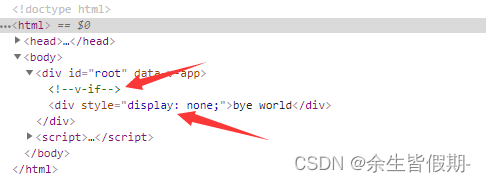
8.0 列表循环
8.1 数组列表循环
<!DOCTYPE html>
<head>
<meta charset="UTF-8">
<meta name="viewport" content="width=device-width, initial-scale=1.0">
<title>hello world</title>
<script src="https://unpkg.com/vue@next"></script>
</head>
<body>
<div id="root"></div>
</body>
<script>
const app = Vue.createApp({
data:function(){
return({
list:['dell','les','teacher']
})
},
template: `
<ul>
<li v-for="value in list">{{value}}</li>
</ul>
`
})
app.mount("#root")
</script>
</html>效果如下:
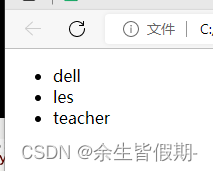
还可以使用 value key 的形式输出
<li v-for="(value,key) in list">{{value}}--{{key}}</li>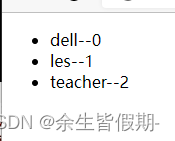
8.2 对象列表循环
<!DOCTYPE html>
<head>
<meta charset="UTF-8">
<meta name="viewport" content="width=device-width, initial-scale=1.0">
<title>hello world</title>
<script src="https://unpkg.com/vue@next"></script>
</head>
<body>
<div id="root"></div>
</body>
<script>
const app = Vue.createApp({
data:function(){
return({
listObject:{
firstName:'dell',
lastName:'lee',
job:'teacher'
}
})
},
template: `
<ul>
<li v-for="(value,key,index) in listObject">{{value}}---{{key}}---{{index}}</li>
</ul>
`
})
app.mount("#root")
</script>
</html>如果 v-for 一个对象 可以获得 value,key,index 三个值
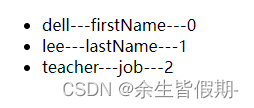





















 6162
6162

 被折叠的 条评论
为什么被折叠?
被折叠的 条评论
为什么被折叠?








